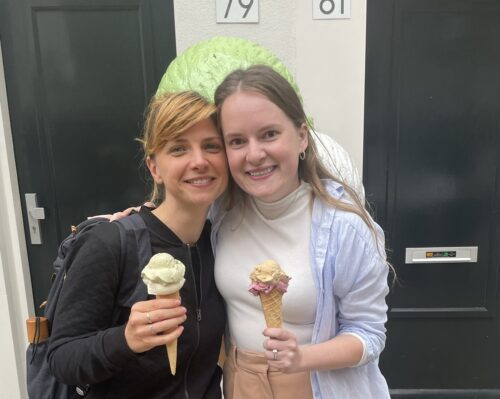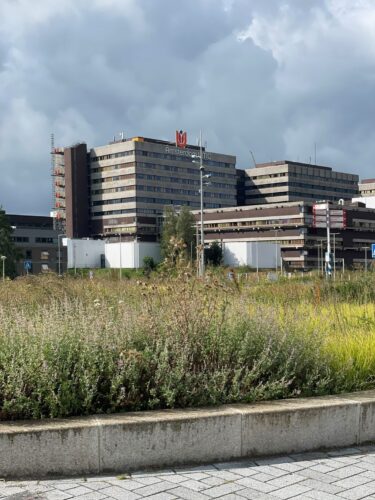
2024 International Collaboration Awardees
International Collaboration Award Progress Update:
Dr. Lehmann at Amsterdam University Medical Center
By Taylor Dattilo, MS, Oklahoma State University & Cincinnati Children’s Hospital Medical Center
I was fortunate to receive SPP’s International Collaboration Award in the Fall of 2022 as a third-year graduate student at Oklahoma State University under the mentorship of Dr. Larry L. Mullins. I am thrilled to provide updates from my visit with Dr. Vicky Lehmann at the Department of Medical Psychology, Amsterdam University Medical Center. I was first introduced to Dr. Lehmann by Dr. Cynthia Gerhardt during my time as a post-baccalaureate research coordinator at Nationwide Children’s Hospital (NCH) due to our overlapping research interests of oncofertility. Dr. Lehmann’s work has largely focused on psychosexual development, sexual functioning, fertility, and other psychosocial outcomes for young adult survivors of childhood cancer. As such, Dr. Lehmann and I have collaborated on multiple projects including examining romantic relationships, physical intimacy, attitudes toward parenthood, maturity, and life satisfaction among young adult survivors of childhood cancer. Despite working with and learning from Dr. Lehmann in these varying capacities, we unfortunately had never met in person to discuss current and future research efforts. Thus, by visiting Dr. Lehmann in Amsterdam, we were able to expand on our previous collaborations by working on projects at her institution. I am sincerely grateful that Dr. Lehmann was enthusiastic about being my primary mentor and collaborator on this award, as she has been a major asset to my development as a professional and researcher. And, I must add, she’s the most fun to brainstorm research ideas with!
More recently, Dr. Lehmann’s research focus has shifted toward also including individuals diagnosed with cancer during adolescence and young adulthood (AYA). Dr. Lehmann’s current major research study examines reproductive goals, fertility, romantic relationships, and sexuality in this population. Her research takes a developmental approach that takes into consideration the unique trajectory youth with medical conditions may follow, which is directly aligned with my current graduate school projects. This is especially true of her projects focused on young adult survivors of childhood cancer that have unique experiences that may differentially affect how they view and experience the world compared to their peers. I was very excited to have access during my visit to one of Dr. Lehmann’s datasets, which includes almost 500 survivors of childhood cancer from Germany.
During my visit, I worked to analyze data to examine almost 200 AYA cancer patients’/survivors’ perceptions of putting reproductive goals “on hold” and subsequent relationship effects, pros and cons of parenthood, and fertility-related uncertainty and concerns. I was particularly humbled by the outpour of support from survivors, some of whom approached the research team asking to participate due to the nature of the topic. This work entitled, “A Life Put on Hold: Navigating Parenthood Considerations and Fertility-related Uncertainty after Cancer in Adolescence and Young Adulthood,” was first presented in November at the Oncofertility Consortium meeting in Pittsburgh by Dr. Lehmann and has now been submitted to the Journal of Psychosocial Oncology. It was an extremely unique growth opportunity to work with a dataset in a different language (i.e., Dutch) as well as have the space to share diverse perspectives within a historically understudied area of research. I believe Dr. Lehmann’s work is a vital step toward further improving survivors’ quality of life as they enter young adulthood.
Through working on this research project, I gained new knowledge about different aspects of romantic relationships among AYA cancer survivors including how cultural considerations may impact romantic relationships (e.g., family planning) for survivors of cancer. Throughout my visit, Dr. Lehmann and I engaged in many conversations about the importance of this research, as well as research collaborations and networking. Dr. Lehmann received training in the Netherlands and in the United States from nationally recognized pediatric clinical psychologists and was thus uniquely suited to teach me the nuances of research collaborations and complexities between hospital systems. Additionally, I had the opportunity to meet with Dr. Lehmann’s colleagues at Amsterdam University Medical Center, including multiple doctoral students and research assistants wanting to pursue graduate school. It was a wonderful experience being able to compare and contrast higher education in the Netherlands versus the United States, as well as hear about the very impressive work being conducted by students in the center. I was fully immersed in lab meetings and enjoyed observing how the center conducts meetings and research.
A highlight of my visit was traveling with Dr. Lehmann to Utrecht to visit her colleagues at the Princess Máxima Center for Pediatric Oncology. I was able to visit with multiple psychologists including Dr. Martha Grootenhuis and her graduate students, Dr. Sasja Schepers, and Dr. Marita Partanen. Next to learning about their various projects, I also shared my current research efforts with their team, including my dissertation project. The structure of the Princess Máxima Center for Pediatric Oncology is such that it centralizes care for all children with childhood cancer in the entire country. The hospital itself was beautiful and I was excited to see the “practice” MRI rooms, the on-campus school, the music room with guitars and pianos, and more. Importantly, I was able to learn about Dr. Grootenhuis’ efforts to implement routine psychosocial screening using PROMIS measures and innovative technology as part of standard/routine care at every oncology visit. Notably, it was a goal of mine to learn about international hospital systems policies and practices concerning psychosocial oncology and to have a well-rounded knowledge base of these practices including barriers to accessing care. Due to the kindness and time that Dr. Lehmann and her colleagues spent with me, I feel this goal was accomplished.
I would like to thank the SPP International Committee for awarding me this opportunity. I would also like to especially thank Dr. Lehmann, Leah Waterman, Dr. Grootenhuis, Dr. Schepers, and Dr. Partanen for providing me with an unforgettable international experience that provided many professional development and learning opportunities. Last but not least, I would like to thank Dr. Gerhardt for introducing and fostering a relationship between Dr. Lehmann and I, and Dr. Mullins for supporting me in missing several weeks of graduate student responsibilities.


